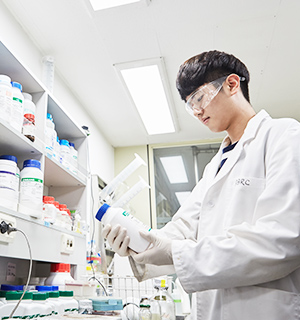
The Department of Chemistry offers education in basic concepts and application of chemistry through lectures and experiments focused on physical chemistry, organic chemistry, inorganic chemistry and analytical chemistry. It also offers advanced courses on physical chemistry (kinetics, quantum mechanics), organic chemistry (physical organic chemistry), inorganic chemistry (organometallic chemistry), new material chemistry, instrumental analysis, biochemistry and organic spectroscopy.
Location : Rm.305, Ogui Hall
Tel : 82-2-940-5240
Fax : 82-2-940-1978
e-mail : yonggary22@nate.com
Website : http://chem.kw.ac.kr
Course Descriptions
Analytical Chemistry(1. 2)
This course is designed to teach fundamentals in analytical chemistry. It covers most major areas of modern quantitative analysis. The topics covered include the analytical methods based on titrations, electrochemistry, spectrophotometry, and chromatography.
Biochemistry(1. 2)
This class deals with the molecular basis of life. It consists of several major subjects; metabolism, enzymes, amino acids, proteins, fatty acids, DNA, and RNA.
General Chemistry and Lab.(1. 2)
This course is designed as an introductory chemistry course for science and engineering students. The concepts of elementary thermodynamics, reaction rates, and chemical bonds are to be taught. This course is intended to help students understand fundamental concepts and skills involved in chemistry through selected experiments.
Industrial Chemistry
This class focuses on industrial chemical products. It consists of several major subjects: fundamental chemical products from petroleum and coal, polymer, plastics, dyes, organic pigments, surfactants, perfumes, rubber, and wood chemistry
Inorganic Chemistry(1. 2)
This course is designed to teach fundamental concepts and models in inorganic chemistry. It covers major areas: principles of bonding theory, main group elements, and transition metal elements; synthesis, characteristics, and physical/chemical properties of inorganic compounds.
Inorganic Chemistry Lab.(1. 2)
This class provides experimental experiences of fundamental techniques for inorganic chemistry laboratory ; synthesis, isolation, and characterization of inorganic compounds.
Instrumental Analysis(1. 2)
Principles and applications of various modern instrumental methods of analysis will be discussed in this course. The topics covered include electrochemical methods, spectroscopic methods, X-ray, mass spectrometry, chromatography, etc.
Organic Chemistry(1. 2)
This course enters undergraduate level. It covers reviews of undergraduate organic chemistry including structures of organic compounds, stereochemistry, spectroscopic determinations of organic compounds, and characteristics, structures, and syntheses of hydrocarbons, peptides, and heterocyclic compounds.
Organic Chemistry Lab.(1. 2)
This class provides experimental experiences of general techniques for organic chemistry laboratory : synthesis, isolation, and characterization of organic compounds.
Organic Synthesis
This class is an advanced level undergraduate course. It introduces late developments of synthetic methodology, new trends of syntheses, characterizations of complicated organic compounds, and natural products.
Inorganic Chemistry(3. 4)
This course is fundamental undergraduate level. It covers synthesis, characteristics, reactivity, bonding structures, reaction mechanism, and catalytic applications of organometallic compounds.
Physical Chemistry(1. 2)
This course is designed to teach basic principles in thermodynamics, electrochemisty, quantum theory, kinetics, and other modern physical concepts of chemical science. Students are expected to have some knowledge of elementary calculus and physics.
Physical/Analytical Chemistry Lab.(1. 2)
This course is a complementary experimental class to physical and analytical chemistry course. Students learn fundamental concepts of physical and analytical chemistry through related experiments and acquire basic experimental skills.
Organic Chemistry(3. 4)
This class is an intermediate level undergraduate course with emphasis on organic reactions and physical or chemical characteristics of organic compounds, which are related with molecular orbital theory.
Polymer Chemistry(1. 2)
This course is designed to teach essential definitions and elementary concepts in polymer science. It covers most major areas : polymerization and copolymerization reaction mechanisms, kinetics, structure, molecular weight determination, molecular distribution, associated properties of polymer, thermodynamics, and statistical mechanics.
Physical Chemistry(3. 4)
This class covers wave-particle duality, Schrodinger equation and interpretation of its solution for various elementary systems and atomic structures will be dealt with in physical chemistry 3. Various approximation methods, such as variation principle, perturbation theory, MO and many other ab-initio and semi-empirical calculations, and kinetics of chemical change are the core subjects for physical chemistry 4
Spectroscopy
This class is designed to help students further develop and apply the fundamental concepts of quantum principles to understand molecular structures and their physical properties with the state-of-the-art modern spectroscopic instruments, such as FT-IR, microwave, laser and NMR. Prerequisites are physical chemistry and quantum chemistry.